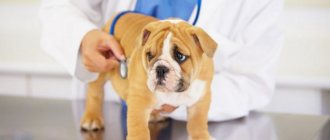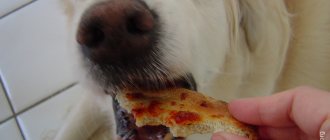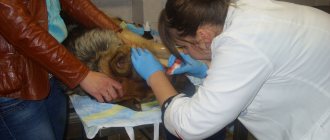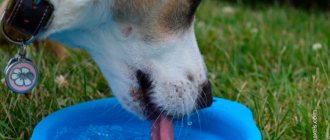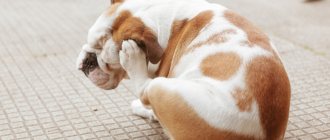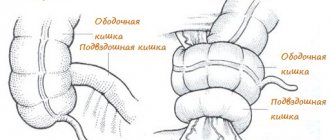A good appetite is an indicator of a pet’s health. Therefore, if a dog eats poorly, only drinks water or does not drink at all, this is a wake-up call for the owner to pay attention to the animal’s health. There can be a lot of reasons why a dog stops eating: from stress and whims to serious problems with the digestive tract. Therefore, it is advisable for every owner to know them so that it is clear how to act in such a case. Let's look at the reasons and what to do if the dog doesn't eat.
Sometimes an animal goes on an artificial hunger strike - a fasting day when it eats less or does not eat at all, but at the same time the pet is active and healthy. The owner needs to worry when the hunger strike lasts more than one day and the pet looks lethargic.
Causes of lack of appetite
The dog stopped eating - there may be several reasons why this happened. For example, she experiences pain when eating due to a broken tooth or gum problems. An ear infection can often cause an aversion to food in an animal. Also, the reasons may not be related to health. The animal is capricious, is taking a fasting day, or is it just such a period. First of all, the owner needs to find out why the animal refuses to eat.
The following signs will help you check if your pet is in pain:
- the animal is trembling or breathing heavily;
- he has a hunched back; there is vomiting or diarrhea;
- the dog is lethargic and irritable;
- the pet sleeps for a long time and does not drink water;
- high fever, dry nose.
Lack of appetite may be associated with diseases of the digestive tract and kidneys.
If your dog doesn't eat anything for several days, you should contact your veterinarian. The specialist must conduct a blood test, ultrasound or x-ray. Tests will help identify the presence of tumors, check internal organs and determine the general condition of the body.
Pathological causes of dog behavior disorder and lack of appetite
When a dog has no appetite, lethargy, not every owner knows what to do. You need to observe your pet for several days. Many diseases have a long incubation period, and only after its end do the first symptoms of a developing pathology appear.
Food allergies as a cause of lethargy in dogs
The cat is lethargic, sleeps all the time and eats little: what to do
Allergic reactions are directly related to the unstable functioning of the immune system. Characteristic signs include lack of appetite, a state of weakness and general apathy.
Note! In summer, reddish spots may appear on the abdomen when in contact with grass.
Oncological diseases
If a dog is constantly sad and inactive, the reasons for this behavior are hidden in cancerous damage to the internal organs. Oncology can develop over a long period of time, and lack of appetite and weakness are harbingers of a malignant neoplasm.
Cancer tumor
Heatstroke or sunstroke
Canines do not have sweat glands. Thermoregulation is provided by breathing, which is why animals breathe with an open mouth. When exposed to direct sunlight or in a stuffy room, your pet may overheat. Symptoms of heat or sunstroke include lack of appetite, thirst and bouts of vomiting. The dog needs to be in a cool place and drink plenty of cold liquids.
Gastrointestinal pathologies and poisoning
Gastrointestinal pathologies, including ulcers and gastritis, also become a source of lethargy in dogs. At the same time, she suffers from decreased appetite and nausea.
When poisoned by drugs, toxic substances, poisonous plants or spoiled food, the animal experiences dyspeptic disorders (diarrhea, nausea), shallow breathing and complete apathy. When examining the mucous membranes of the mouth, pronounced pallor of the gums is noted.
Dental problems in a dog
If the puppies are lethargic and do not want to eat, then the problem may be related to age-related changes in teeth (due to painful sensations during teething). In addition, pets may suffer from:
- from caries;
- gingivitis;
- periodontitis;
- tartar;
- jaw dislocation.
Important! A sign of lesions in the oral cavity is the animal's unsuccessful attempts to eat. Any of these pathologies requires a visit to the veterinary clinic.
Pulpitis in a dog
Ticks and skin diseases
When a dog is lethargic, refuses to eat and lies down all the time, one should suspect a tick infestation. Parasite attacks occur with the arrival of heat, the result of their activity is piroplasmosis with subsequent destruction of the liver. The main manifestations of the disease are presented:
- an increase in temperature to 40 ° C (the pet begins to tremble);
- refusal to eat;
- darkening of urine;
- apathy.
Important! Skin diseases are identified by hair loss and the presence of wet or dry areas. The animal requires diagnostics at the nearest veterinary clinic.
Viral diseases
If the dog is not eating well and is very lethargic, then the source of the problem may be:
- a common cold;
- carnivore plague;
- rabies, etc.
Dangerous pathologies are manifested by photophobia, mood swings and convulsive syndrome. If the animal has not had vaccinations, then the chances of survival are significantly reduced.
Carnivore plague
Stress and anxiety
Stressful situations arise not only for owners, but also for their four-legged pets. Excitement is possible when moving, visiting unfamiliar places, a beloved owner leaving on a business trip, or the appearance of a child or new family members in the family. Any of these factors can lead to loss of mental balance and drowsiness. The pet stops being active, barely jumps, and refuses to walk more than a couple of meters.
Note! Animals are affected by the changing seasons, so they appear listless for no reason.
Cold and hypothermia
Weakness in dogs can be caused by hypothermia when the temperature drops to 37 °C. Hypothermia is caused by:
- long walks in winter;
- injuries of various origins;
- diseases of the central nervous system and cardiovascular system.
For your information! In some cases, a drop in temperature is observed with pathologies of the endocrine system.
Frostbitten paws
Dehydration
Insufficient fluid intake leads to a lack of electrolytes, blood thickening, and an increased risk of thrombosis and kidney failure. The animal needs rest and sufficient drinking water.
Important! The condition is checked by the nose, which should be moist or wet, not dry.
Insect bite
Attacks by bees and wasps lead to allergies, and bedbugs provoke obsessive itching, swelling and intoxication. Treating bites with home remedies is useless, as the pet needs professional help.
What tests will help determine the disease?
A veterinarian can give an exact answer to the question of why a dog doesn’t eat anything after conducting certain tests. Typically, specialists perform the following tests:
- general blood analysis
- X-ray (will show there are tumors)
- Ultrasound (to diagnose the condition of internal organs)
- test for Addison's disease.
Diseases that cause lack of appetite
- Intestinal disease – enteritis. Accompanied by vomiting and diarrhea, fever.
- The presence of a foreign body in the body. Accompanied by refusal to eat, vomiting with undigested food, loose stools or, conversely, constipation.
- Volvulus. The classic sign is bloating.
- Intussusception is intestinal obstruction. Signs: refusal to eat, vomiting with blood, problems with stool
- Kidney or liver failure, gastritis or stomach ulcer.
- Sore teeth, sores in the gums or mouth, or a foreign body in the mouth (such as a stuck bone).
When lack of appetite is normal
In some cases, the dog does not eat or drink for natural reasons, and the owner does not need to do anything. Let's look at when this happens:
- period of estrus in females (in this case, the animal does not eat well, only drinks water; appetite should normalize after the end of the cycle; if not, you should contact a veterinarian.);
- puppies during growth (appetite disappears and appears)
- period of teeth growth (the dog does not eat anything or eats poorly, what should the owner do - give the pet soft food at this time)
- hot weather (at this time the dog refuses food and only drinks water)
- new food (if your dog suddenly stops eating, check to see if his diet has recently been changed or new additives have been introduced to his food)
- the whims of the animal (the dog may refuse to eat due to the presence of some unloved foods in it)
What should the owner do?
If a dog stops eating, what should the owner do? The first step is to determine whether refusal to eat is normal or an anomaly. For example, if a dog is lethargic, vomits, and does not even drink water, then this is not normal. You should take a close look at your pet's health. If this lasts more than one day, you need to contact a specialist for help.
If the dog does not eat and is lethargic, and also vomits, this may be a sign of the presence of worms in the body. Also pay attention to the nature of the vomiting. Yellow and with bile may indicate that the animal ate grass during a walk and thus cleanses the stomach. Excess bile in the body can also indicate poor nutrition. In this case, the animal must be put on a special diet.
If an animal vomits blood, you should immediately contact a veterinarian. If an animal's vomit contains undigested food, this indicates problems with the intestines. This is how cancer can manifest itself in an old dog.
The owner should also sound the alarm if a large amount of water comes out with vomiting. This is how the animal’s body becomes dehydrated.
If the dog does not eat anything, only drinks water, this may indicate the presence of a digestive tract disease. In this case, the animal may not eat at all or eat poorly, and it needs to replenish its fluid reserves. If a dog does not eat for 4 days or more, it must be seen by a doctor.
General recommendations
If the dog has stopped eating, the owner should try to “work up” its appetite. To do this, they advise:
- actively walk your pet (maybe the animal has low physical activity and because of this there is no desire to eat)
- skip 1-2 feedings (do not change the diet, do not follow your pet’s lead by giving something tasty)
- change your diet a little (for example, change cereals).
- add fish to the diet (10 minutes before meals, give your dog a piece of salted fish. This will affect its appetite).
You can also try a trick - give a portion of the animal to another pet. These methods will help restore appetite if the animal is healthy.
When to see a veterinarian
The dog has stopped eating and is lethargic: what to do?
With weakened immunity (in young and elderly individuals), any cold, food or chemical poisoning, or gastroenteritis can be fatal. A trip to the veterinarian should be mandatory if your pet exhibits the following symptoms:
- dyspeptic disorders with attacks of diarrhea and constipation;
- the appearance of blood particles in the stool;
- prolonged nausea - more than 48 hours;
- pronounced dullness and massive loss of hair;
- dryness or yellowish discoloration of the skin;
- inflammatory processes in the oral cavity;
- discharge of purulent secretion from the eyes;
- trembling of limbs;
- changes in the standard color of urine and feces (dark or brown);
- changes in the animal's behavior.
Why do you need a veterinarian? If you ignore these signs and refuse to visit a veterinary clinic, the disease will go from acute to chronic or death.
Don't put off going to the vet
General feeding rules
Pay more attention to your pet, calm him down and talk to him - this will help cope with stress.
If you changed your diet, return to your previous diet. And it is worth introducing all new products gradually so that the pet gets used to them.
Follow the feeding rules: give the animal food at the same time. Remove the bowl after your pet has eaten - there is no need to allow him to approach the plate several times.
If your dog is not eating anything and is vomiting, be sure to take him to the vet. Don't delay. It is better to diagnose the disease at an early stage.
Why the dog doesn’t eat is a question every owner asks sooner or later. An animal's appetite, like a person's, can disappear for various reasons. For example, a pet is upset and eats poorly. Also, the reason why the appetite has disappeared may be trivial: the pet is capricious and thus wants to get something tasty. On the other hand, the animal may be in pain and therefore refuse to eat. In such cases, the owner needs to be very careful: observe the pet’s behavior and activity, remember what he fed it the day before, whether he ate something on the street, and so on. If the dog is lethargic and does not eat or drink for several days, you need to consult a doctor. If no other signs of illness are detected, the dog is not lethargic, active, and cheerful, then you can wait a little, skip one feeding, work up an appetite, or tease your pet with salty fish.
The owner’s main task is not to leave this matter to chance. You definitely need to take action: monitor your pet and analyze the situation. Correctly identifying the causes of hunger strike is the key to quickly eliminating the problem.
Author of the article: Victoria Rodik
Chief editor of the site. My love for our smaller brothers has grown into an interesting hobby: collecting and systematizing information about dogs, which allows us to better understand their nature. I willingly share my achievements and hope for close cooperation from readers. Linkedin, Facebook
There are times when a dog behaves lethargically, has no appetite, and has no desire to go for a walk. There is no need to worry right away; it is important to observe your pet. Maybe the dog is just tired or not in the mood. If the animal continues to have this condition the next day, it is advisable to take it to the veterinarian.
If the dog does not eat, is lethargic and... (example reasons for additional symptoms)
If the lack of appetite is accompanied by lethargy, elevated body temperature, trembling, thirst, changes in the color of the mucous membranes and skin, vomiting and diarrhea, these are clear signs of health problems. The owner of the dog can only guess what happened to the pet; only a veterinary specialist can make an accurate diagnosis.
We recommend reading: How to improve a pet’s life without heat, water and sun?
To do this, the veterinarian conducts a clinical examination and:
- laboratory blood and urine tests;
- X-ray;
- Ultrasound of internal organs;
- endoscopy.
If the dog is lethargic, does not eat anything and...
| Symptom: | Probable reasons: |
only drinks |
|
doesn't drink |
|
has an elevated body temperature |
|
vomits |
|
vomits and diarrhea |
|
diarrhea, vomiting and high fever |
|
vomits foam |
|
has yellow mucous membranes or skin |
|
trembles, tries to move less, breathes heavily | pain syndrome of various localizations. |
sleeps a lot, lies down, does not react to external stimuli and does not drink | Take it to a veterinarian immediately to determine the exact cause! |
Easily Solved Problems
Check the freshness of the food, the abundance of spices and salt. Refusing additional food between meals is what you should do first if your dog does not want to eat. It has been proven that all kinds of delicacies interrupt the appetite, after which the main diet seems less tasty to the four-legged friend.
Starvation can be explained by the transition to dry food, which, out of habit, seems unappetizing to the animal. Moreover, a sudden change in food can negatively affect the functioning of the gastrointestinal tract, so veterinarians advise changing the diet gradually.
Cheap kibble is based on beans and soy, which will definitely not cause a stir in your pet. Another nuance is the problem with chewing: it is difficult for an old animal to eat hard food due to thinning of the enamel, and for puppies - due to loose teeth.
Natural causes of hunger strike
Consider a number of cases when refusal to eat is considered normal, without requiring any intervention:
- hot weather - in summer the dog is able to not eat for a whole week, but only drink water;
- an excess of vitamins – the body has enough nutrients, and the animal feels great without food;
- reaction to stress - appetite disappears due to a change in owner, environment or weather conditions;
- teething - to prevent discomfort, during this period it is better to give the puppy soft food.
- growth period - a constant feeling of hunger often alternates with loss of appetite.
- puberty, end of pregnancy and childbirth - changes in the body at the hormonal level cause a decrease, and sometimes a complete lack of appetite;
- old age - an elderly dog often does not eat anything and walks lethargically.
Causes:
- decreased blood glucose levels (hypoglycemia);
- increased blood glucose levels (hyperglycemia);
- increased sodium levels in the blood (hypernatremia);
- decreased sodium levels in the blood (hyponatremia);
- low blood pressure;
- renal failure;
- brain disease;
- trauma (especially to the head or brain);
- infections (viral, bacterial, parasitic, fungal);
- drugs that lead to loss of consciousness;
- unknown causes (idiopathic);
- immune-related diseases (the immune system overreacts or attacks the body);
- chemical or drug poisoning.
What to do?
If the dog does not want to eat anything, determine how much liquid the animal consumes. If the indicator is within the normal range, then you can move on to the next step; if not, you need to urgently take your pet to the doctor.
Then you need to measure your body temperature, taking into account that the optimal indicator is considered to be 37.4-39°A - this depends on age and breed. If the dog is lethargic and does not eat anything, and the thermometer shows a critically low temperature, it is necessary to warm the animal and take it to the veterinarian.
Or at least get specialist advice over the phone. At a slightly elevated temperature, it is necessary to repeat similar measurements every two hours, and in case of fever, lower the temperature and consult a doctor. A normal temperature indicates the need to continue the examination.
The next stage is a thorough examination of the peritoneum, which should not be tense and swollen, as well as the oral cavity (pay attention to redness and stains, broken teeth). In a healthy individual, the ear canals are clean and the mucous membranes are pale pink.
A lethargic dog that does not eat its usual food most often requires qualified help. The owner can only guess what happened to the pet; the diagnosis is made by a veterinarian.
The following manipulations will probably be required:
- endoscopy;
- ultrasonography;
- X-ray;
- urine and blood tests.
What actions should the owner take?
You can restore your appetite by solving the problem that led to the hunger strike. When the refusal is associated with stress, you need to give your pet more time and attention; if the reason is a change in diet, it is better to return to the previous option and introduce new products gradually.
At the same time, it is important to adhere to the diet and exercise regime. Try to improve your pet's appetite by increasing the time of active walks.
Always monitor the animal’s well-being in order to come to its aid in time. Timely actions are the key to your dog’s health and longevity!
Advice from a veterinarian if your dog is poisoned and refuses to eat:
A healthy dog is active, has a good appetite and is always happy to go for walks. Pets, like people, are susceptible to diseases and negative external factors. What to do if the dog is lethargic and does not eat, what could be the reason? The animal is not able to tell us about its ailments. A caring owner should be able to distinguish the dog’s banal fatigue from diseases and pathologies.
How to restore your pet's appetite?
- Eliminate the root cause, which is accompanied by loss of appetite: problems in the oral cavity or cure the underlying disease.
- If your dog is stressed or depressed, you need to try to spend more time on it, pet it, and soothe it with a gentle voice. With enough attention, the dog will return to its previous appetite fairly quickly.
- If food refusal accompanies a change in diet, then it is recommended to return to the same food and move to the new diet slowly, gradually introducing new ingredients.
- If you refuse to eat due to whims and pickiness, you should start feeding the dog strictly at the same time, and with each refusal to eat, the bowl of food should be removed. With a healthy, short-term hunger, the dog will eat everything that is offered to it.
- There is no need to leave food out all day or all night after feeding to prevent the food from going sour, which will also cause the dog to refuse it.
- There is no need to compensate for a missed feeding with an increased amount of food at the next meal.
- Active walks before feeding increase appetite.
- On the recommendation of a doctor, you can stimulate your appetite with special veterinary drugs (Enervita, Gamavit, Aminovit, etc.) or herbal decoctions (wormwood and dandelion).
- If the dog is poisoned and does not eat anything, you should start with a starvation diet and classical detoxification therapy, followed by a gradual restoration of appetite.
- In case of an individual reaction to certain medications, it is necessary to consult with a doctor regarding the issue of discontinuing the drug, which provokes a decrease in appetite, or replacing it with a more benign one.
We recommend reading: Setting up your first aquarium
An attentive owner will always notice that something is wrong with his dog and will understand whether these changes are temporary, or whether things are much more serious. Competent observation of the pet, the ability to notice nuances and timely delivery of the animal to the veterinarian is the key to a quick cure and return to the dog’s previous lifestyle.
Diseases and pathologies
Diseases and various disorders can cause an inert, lethargic state in a dog:
Infectious diseases. Dogs suffer from toxoplasmosis, tuberculosis, distemper, hepatitis, intestinal and many other diseases of viral, bacterial and fungal origin.- Diseases of the cardiovascular system. Pathologies can be congenital or acquired. Heart disease in dogs often develops due to overeating, lack of activity (if a large dog lives in a small apartment), or in old age. Characteristic symptoms, in addition to lethargy, are shortness of breath, wheezing, and dry cough.
- Blood diseases. The animal may have anemia or other circulatory system disorders. If there is not enough iron in the blood or there are other abnormalities, lethargy will be permanent.
- Diseases of bones and joints. A dog loses activity when movement causes it discomfort or pain. The animal becomes weak and loses stamina.
- Oncology. Weakness and poor appetite are the first and often the only symptoms of a developing malignant tumor.
- Neurological diseases. Any pathology of the nervous system can cause an abnormality in the behavior of animals.
- Allergy. Immune system disorders are very insidious and are not always accompanied by severe symptoms. Lethargy, loss of appetite, weakness are characteristic signs of allergies. In summer - red spots on the belly, as dogs like to “burrow” into the grass above their height.
If the dog is lethargic, but eats, responds to your commands, and agrees to go for a walk, this does not mean that it is not sick. Many diseases have a long development period and mild symptoms.
Main reasons
In veterinary practice, three varieties are most often found. So, a dog’s coma often occurs as a result of:
- Diabetes (sugar or non-sugar);
- Liver failure;
- Kidney failure.
In all these three cases, the mechanism of development of the pathology is relatively typical. As a result of the failure or inadequate functioning of a vital organ (liver or kidneys), decomposition products, especially nitrogenous bases, begin to accumulate intensively in the blood. When their volume reaches a certain critical point, the body simply cannot stand it. Almost the same thing happens in diabetes, when coma occurs as a result of severe intoxication with ketones and acidosis. Thus, a dog after a coma will never be “fresh as a cucumber,” since in almost 100% of cases a dog in this situation has problems with the excretory system, liver and nervous system (the brain is almost always damaged after lethargy).
What to do?
You should be concerned if behavior unusual for your pet persists for more than 3-4 days. Without
examination and test results cannot make a diagnosis. It is required to undergo all necessary procedures at the veterinary clinic. If your dog develops other symptoms along with lethargy (fever, severe vomiting and diarrhea, breathing problems, abnormal discharge), contact the clinic immediately.
To avoid trouble, the owner should constantly monitor his friend. Provide him with high-quality nutrition and monitor reactions to certain foods. Keep the bowl of fresh water full at all times. Inspect the fur for the presence of parasites. Make sure that the dog does not eat anything found during walks. Do not keep the animal in the heat and sun for a long time.
